|
As my friend Pooh demonstrates here, thinking is hard work. Thinking about thinking is even harder. We each subscribe to an emotional system and an intellectual system, and which one we access on any given day is likely to determine what we will be doing on the following day. Our ability to separate these two systems and choose between them at will is an important goal, and when we are able to adhere to self-directed behavior and performance in the chaotic lives we tend to lead, then we have made some real progress.
I once spent a year in an intense postgraduate clinical program that demanded the outpouring of latent feelings from a faculty that, as individuals, had not dealt appropriately with their own underlying “issues,” as they chose to describe it. Needless to say, little thinking got done. When we unleash our feelings on others, we force the other to suffer, usually unawares—but sometimes—I’m convinced—through an avenue of simple evil. Thus was the result of my experience there; a firehose of anxiety and shame-baiting. Ethics is not always a consideration in the places where one expects it most, and healing can be hard to come by. Some years later, I was invited to another postgraduate project that promoted the efficient use of the cerebral cortex, the antithesis of what I had encountered in the previous program. The study, supervision, and group interactions at the Bowen Center for the Study of the Family were appropriate methods rooted in an exhaustive and well-balanced theory. It required one to think for oneself, and was absent the often-perceived need for confrontation. It actually allowed me to make better use of the previous training. Still years later, I again entered a program that, for me at least, was a balanced combination of the better aspects of the previous two. It was one that permitted me to combine my spirituality with science in an effective way. It allowed me, for better or worse, to be me. When we are truly called to think, we permit others to be who they were created to be, not who we wish them to be. Hopefully, we are called to think, and to do so in a way that is redemptive for self and others. What avenues permit you to put forth your best thinking? How will that wonderful thought process benefit others? Be your best: Be thoughtful. Let us take the time and effort to think, as opposed to the explosive emoting that has become so prevalent in our society.
0 Comments
Within both of my spiritual traditions (Protestant & Cherokee), healing has and does play a prominent role. In the Hebrew Scriptures, the prophet Isaiah acts as an oracle to prophecy about the Egyptians returning to their Creator, where they undergo healing (Is. 19:22). In the New Testament, Paul’s first letter to the Corinthians speaks of the various gifts we have been given, including that of healing (1 Cor. 12:9). In Cherokee thought, the animals and plants work in the humans’ favor to bring healing and restoration (Mooney: History, Myths, and Sacred Formulas of the Cherokee). For the purposes of healing, both in the hospital and in the church, I have been known to use olive oil consecrated in the name of the Holy Spirit, and I have employed a feather dipped in lavender and sage in the name of the Great Spirit. Both are sacred paths to the same God, the God of the medicinal. Outside of my traditions lie many paths to healing, and people are called to heal self and others in the ways that make the most sense to them. Healing is sometimes associated with the heart. My coronary arteries took quite a beating from young adulthood cancer chemotherapy. My heart gave in to this abuse one cold March morning in 2008. I was given two balloon angioplasties and two stents. They “repaired” my right circumflex artery and my left anterior descending (LAD), sometimes called the “widowmaker.” I despise the term, for it is obviously not life-giving, and the stenting of the LAD almost killed me, literally. Some of the scar tissue that has since formed serves, as does my medication, as a reminder. Healing should be about renewal, as should any call associated with it. I believe we are called to the process and reality of healing. We are called to bring wholeness to others; that’s part of why we are here yo! Who needs your healing touch? Is there someone that you can start on the path to healing by your kind words, your gentle touch, or your listening ear? I have been healed in so many ways. Yet, perhaps like you, I remain forever scarred in some ways as well. When opportunities for healing come up, we should take them, especially if we can participate in the healing of another. I have devoted much of my professional life to listening to the problems, concerns, and secrets of others. It has been my honor. Listening can be exhausting work. I think all of us are called to listen at different times. The difference in listening as a profession and listening as an avocation may well be how much the listener can stand! Most of us like to think that we listen effectively, but the amount of conflict on this earth seems to be a valid means with which to dispute this.
Bill Rose, the gentleman in the accompanying photo, was a neighbor, dear friend, and an avid listener. Our “Starbucks Moments” gave me much in which to look forward. Was Bill a “professional listener?” No. Was he a kind soul with my best interest at heart? Absolutely. Good listening requires a focus, symbolized by Bill’s concentration on the subject of his camera lens in the picture. Bill and I shared a love for my hometown, Charlotte, and we would sit with our java and hammer the world’s problems on the battlefields of Dilworth, Sedgefield, or Cotswold in Charlotte. Can you tell that we solved them all? Bill’s gift to me was the gift of presence. Bill was called to listen (at least to me), and I miss him. Bill and I spent many hours recalling Charlotte’s past. Who had the best fries, Zack’s or South 21? Which mall: Charlottetown, Eastland, or SouthPark? Cotswold Shopping Center, Eastway Shopping Center, or Park Road Shopping Center? We reminisced about Bailey’s Cafeteria in Cotswold, The Barclay Cafeteria in Amity Gardens, the S&W Cafeterias, Green’s Lunch, Price’s Chicken Coop, the Capri Theatre (my first job), Charlottetown Cinema, the Manor Theatre, and so on. We had fun, responsive conversations because we listened to each other. Do you have someone who listens to you, someone that has your best interest at heart? That, incidentally, would be someone who listens without interruption or judgment. It really isn’t helpful for most of us to receive unsolicited, highly-emotive advice from “friends” or family. We do better, they do better (whether they are aware of it or not), and the relationship fares better when we listen with the attention due the other, absent a need for corrections or evaluation. Are we listening? How can we do better? Once in a while, we get it right: We lead from principle, which is to say, we are not prone to compromising our core values. We also get it right when we lead with kindness. Frequently, leaders in our society have chosen either not to value kindness or have lost the ability to lead with kindness; either way, the leadership of kindness has become scarce. We must get it back.
When we “lead” through lack of civility, we instantly abdicate whatever authority might have been there in the first place. I hope you will be different if you are being called to lead. I pray that one of your trademarks will be generosity. The world needs it. Certain elements of society, and we see this today at the pinnacle of our government, see kindness as weakness. This is a rookie mistake of the first order. It just so happens that we can be commanding, principled, firm, and yes—charitable. Five years ago, I had the pleasure of the benefit of exceptional leadership. My clinical supervisor at the time, The Rev. Dr. Larry Easterling, was one of those “different” leaders, the kind that didn’t need to employ malice or spite to do his job effectively; the type of leader that our society is screaming for. Larry was challenging yet fair; theologically profound yet clear and accessible in his communication. Good leaders were usually good followers. Larry, a veteran of the Peace Corps, had to have been a good follower to have achieved his level of style and leadership. Some people are not called to lead, and that’s fine. Being a good follower is a wonderful gift. If, however, the call to leadership comes your way, be kind; be accessible. Be different. It will reflect your strength in leadership. Anyone can be nasty. We’ve had enough of that. Should the call to lead ring your bell, be like my friend Larry. Be exceptional, and never forget that others are watching, taking notes, and might be writing about you someday. It pays for each of us who lead, will lead, or have led to remember the Golden Rule (Matthew 7:12). We are human and unable to achieve it every time but it should be our objective. Are you being called to lead? What is your idea of good leadership? Brian Piccolo was a Chicago Bears team member from 1965-1969. For men like me, Piccolo left a path to follow, and I was called to emulate him in more ways than one. During his tenure with the Bears, Piccolo developed embryonal cell carcinoma, an uncommon form of a rare type of cancer: testicular cancer. During his senior year at Wake Forest University in 1964, Piccolo led the nation in rushing. He was considered too small to play professionally, something to which I can relate. Coach George Halas signed him anyway.
As the 1967 season approached, the Bears executive staff asked Piccolo and star running back Gayle Sayers if they would be willing to room together (for a glimpse of the “Magic” that was Gayle Sayers in his prime, view this 30-second clip of footage used in the movie, Brian’s Song). Sayers and Piccolo became the first interracial roommates in the National Football League. The two men also became good friends, and Piccolo performed brilliantly when he filled in for Sayers after Sayers received a devastating knee injury. Sayers made a comeback, and, though the knee was never the same, he remained on the team through the 1971 season. Brian Piccolo died of embryonal cell carcinoma in June, 1970. In June, 1986, I was diagnosed with it. Thanks to the efforts of Joy Piccolo O’Connell, Piccolo’s widow, and the support of many Piccolo friends and supporters, the Brian Piccolo Cancer Research Fund has raised many millions of dollars over the years, and men like me are alive today due to the concentrated efforts stemming from the focus on curing this particular form of cancer. I have been in remission for 31 years and I can still smell the Jordan Ward, an inpatient chemotherapy nursing unit “back in the day” at what was then Duke University Medical Center. I've also been blessed with a relatively long life, as well as many opportunities to follow in order to learn the basics of how to lead. If cancer and its treatment is anything, it is humbling, and it prepared me to follow a different path. Sometimes, we’re called to follow in the footsteps of giants. America places much emphasis on producing great leaders, when perhaps what we need first is people who know how to follow. As a Christian clergyman and a Cherokee descendant, I try to follow Jesus and my own interpretation of the Great Spirit. I am, however, proud to also follow in Piccolo’s footsteps, in the shadow of a young man whose legacy has helped countless individuals. Following in this manner is truly a calling in and of itself. Who are you following, and why? How do we sacrifice for one another? The hope is that when we surrender on behalf of others, we do so from the goodness of our heart while adhering to our guiding principles. This type of sacrifice enables us to continue loving the other without becoming bitter. We are not called to sacrifice boundaries.
Some years ago, I found myself supported by Chris, a wonderful pastor who had my best interests at heart. He was called, I think, to sacrifice on my behalf, as he made it part of his mission to ensure that I did not encounter the abuse I endured in a previous ordination process. Chris ceded his time and emotional energy on my behalf, representing the truly beautiful side of the ordained ministry. Thanks to Chris and two wonderful groups of people who comprised my licensing committee and later ordination council, I was restored. Could you be called to sacrifice some time and energy to the service of another? If you are a parent, you are constantly sacrificing your time and energy for the necessary purpose of raising your children. Are you possibly being called to sacrifice temporarily for someone other than them, perhaps to give you a much-needed respite from your regular duties? Sometimes, our loved ones desire to communicate thier affection and their confidence in us. Should you elect to answer another call to sacrifice, remember that you are loved and respected, particularly by the persons who cannot seem to find the gumption to tell you so. It is, after all, a sacrifice. "Dogs Playing Poker," by C.M. Coolidge
Well, here we are, in 2018. How will we live it? Can we live our lives in the moment? In 23 BC, Horace suggested that we “seize the day” (carpe diem). His reflection was about enjoying the present. During my 20’s, dogs changed my life. There wasn’t one dog in particular. A succession of them gave me back my soul. It was springtime in 1991 and the freight train of life had run me over the previous year. My day-to-day functioning had been at a record low. I had even been homeless for a brief time. A loving hobby, however, magically became a profession and my four-legged friends repaired some serious wounds and suddenly I had advocates everywhere. I was learning the ropes of private, in-home instruction of both owner and dog. I made mistakes, of course, but the dogs centered me. A canine lives in the moment. If you don’t believe me, check out these guys in the painting by C.M. Coolidge. They have mastered the art of the cool breeze. I learned to savor the moment when the dogs began sharing sacred space with me. In truth, I had learned this art at twenty-three as a young, scared cancer patient. This was during the mid-1980s; America was in no state of declared war, and most of us were enjoying prosperity and none of my friends could relate to my life-and-death struggle. I wasn’t really given space to practice the art of seizing the day. It was the dogs that truly gave me that opportunity. This led me to recognize subsequent callings and to embrace them for the gifts they were. I could not have done this without learning the art of just hanging out and being. When I first moved to the Seattle area, I was in an otherwise respected chaplaincy position at an acclaimed research facility and was excited about the possibilities, having come 2700 miles from a previous chaplain position where I had enjoyed success. I soon learned, however, that I had been misled and was trapped (until I paused, “kicked some grass over that stuff,” and walked away) with three condescending, disdainful characters who saw it as their avocation to patronize and find fault with the new people. Not only could they not savor the moment, they worked hard at preventing others from doing the same. A colleague, who entered the department the same week I did, reported the same experience and, I’m happy to say, is doing well elsewhere. His own ability to live in the moment has flourished. Please, for God’s sake, be like the dogs, and learn to savor the moment. Trust also that you are being called to permit others to do the same because, frankly, we owe it to them. How will you savor the moment in the New Year? |
Yona Ambles"YOH-nuh" (yonv) means "bear" in Cherokee. Thanks for visiting! Archives
January 2024
|
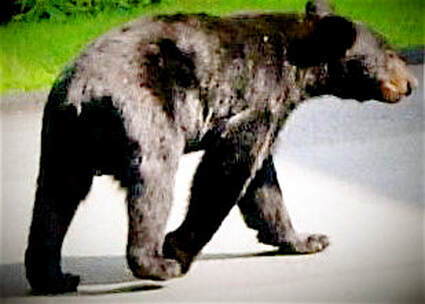
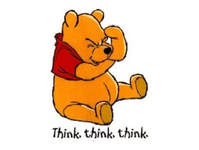

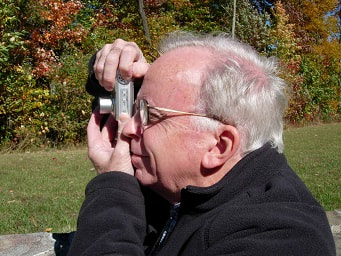
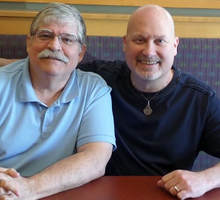
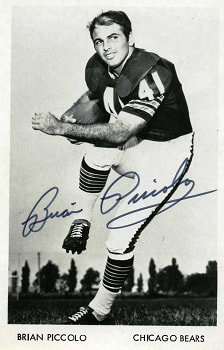
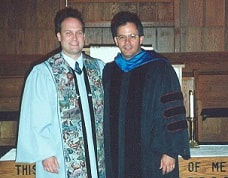
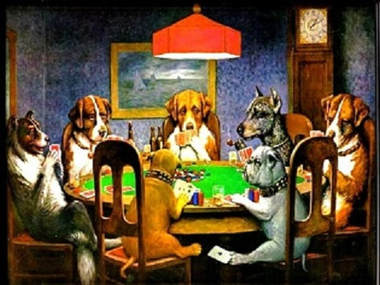
 RSS Feed
RSS Feed
